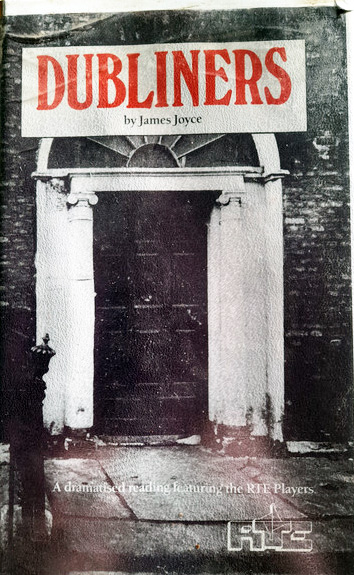Joyce Audio – Audiobooks: Dubliners
- At December 01, 2022
- By Great Quail
- In Joyce
 0
0
Joyce Audio: Dubliners
This page profiles professional and commercial recordings of Dubliners. Most links take you Amazon, where you may listen to samples and download digital “aax” files for your Audible-enabled device. Other media such as LP, cassette, CD, MP3, and FLAC are listed separately.
Recommendations
For visitors daunted by the number of Dubliners recordings, and just want a quick recommendation, my favorite is the Caedmon 2000 Dubliners with the all-star cast. Sadly, it’s not available on Audible. As for the many Audible versions, my top pick is the Penguin 2019 version read by Andrew Scott. You also can’t go wrong with the Naxos Dubliners, the Tadhg Hynes set, or the T.P. McKenna reading.
Joyce Audio
[Main Page | His Own Voice | Collections | Dubliners | Portrait | Ulysses | Finnegans Wake | Drama & Poetry | Biography & Criticism | Miscellany]
Unabridged Readings
Dubliners
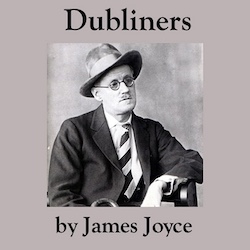
Dubliners
Read by Jim Killavey
Jimcin Recordings, 1987
Unabridged; 6 hours, 56 minutes
Jimcin Recordings was founded in 1977 in Rhode Island, an early “books on tape” company that produced dozens of audiobooks, including several cassettes of local favorite H.P. Lovecraft. Their star reader was American actor James R. Killavey. (In fact, some Internet sources list Killavey as Jimcin’s director.) Although Jimcin is no longer a going concern, most of their catalog has been acquired by Audible. Killavey retains his native East Coast accent for most of Dubliners, but livens up the dialogue with affected voices and—let’s be kind, shall we?—a serviceable Irish accent. Killavey’s voice has interesting contours, elongating final syllables and clipping others dramatically; but since he made this recording in 1987 much better alternatives have become available.
Dubliners (RTÉ “Dramatised Reading”)
Dubliners (RTÉ “Dramaticised Reading”)
Directed by William Styles. Performed by the RTÉ Players
RTÉ, 1988
Also available as: Internet Archive MP3 | RTÉ Streaming
Unabridged
Produced for Irish radio, this “dramatised reading” of Dubliners was issued as a 6-cassette box set in the 1980s. Recently, RTÉ’s “Drama on One” placed the series online as streamable individual episodes. The quality of the production is quite good, and the dramatizations are well executed—the conservative approach of the 1980s RTÉ Players suits Dubliners more than it had served Ulysses six years prior. Although this set is unavailable on Audible, the stories can be downloaded as MP3s through the Internet Archive.
Dubliners
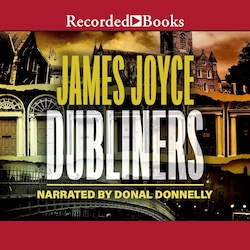
Dubliners
Read by Donal Donnelly
Recorded Books, 1991
Unabridged; 8 hours, 48 minutes
Recorded Books was founded in 1978 by Henry Trentman, a salesman who grew weary of listening to single-cassette abridged books on his car stereo. Devoted to the production of massive, unabridged sets which consumers could rent instead of purchase, Recorded Books grew from a small Maryland company to a million-dollar concern, gobbling up numerous competitors such as HighBridge Audio (Garrison Keillor’s old home) and Tantor Media. Recorded in 1991, Dubliners features Irish actor Donal Donnelly (1931-2010), celebrated for his work with the playwright Brian Friel. Donnelly also starred as Freddy Malins in John Huston’s The Dead. He reads Dubliners in a husky tenor, offering a theatrical narration that avoids showiness and smartly emphasizes dialogue.
Dubliners
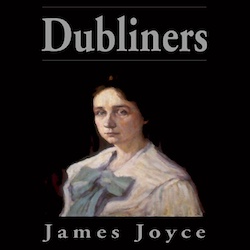
Dubliners
Read by Frederick Davidson
Blackstone Audiobooks, 1992
Also available as: Cassette | CD | MP3-CD
Unabridged; 7 hours, 24 minutes
Blackstone Audio was founded in 1987 as “Classics on Tape,” and used actors from the nearby Oregon Shakespeare Festival as narrators. One out-of-state actor that came recommended to them was David Frederick Case (1932-2005), a British actor, director, and antiques dealer living in San Fransisco. Introduced to the world of audiobooks by an associate, Case went on to narrate countless works for Books on Tape and Blackstone Audio. (He used a different name for each company, which is why his recordings sometimes appear as David Case and sometimes as Frederick Davidson.) One of the most famous audiobook narrators of the 80s and 90s, Case was renown for his rich, plummy voice and theatrical delivery—he possessed one of those English accents that draws out monosyllabic words, each vowel charged with subtle undercurrents ranging from bemusement to contempt. (Case’s detractors have called his voice “snooty,” and they’re not wrong!) While his reading of Dubliners is certainly more “English” than most, it’s well worth hearing, despite the presence of undue background noise.
Dubliners
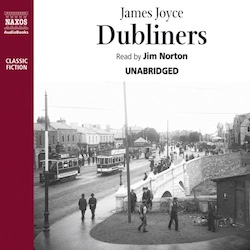
Dubliners
Read by Jim Norton
Naxos, 1999
Also available as: CD
Unabridged; 6 hours, 50 minutes
The Naxos Dubliners is read by Irish actor Jim Norton, whose association with Joyce spans a long and distinguished career. As with all Norton’s Joyce recordings, his reading of Dubliners is tasteful, sensitive, and melodious, featuring the perfect amount of vocal affectations and theatrics. The set was produced by the composer Roger Marsh, who included musical cues, mostly ballads and arias transferred from vintage 78-rpm recordings. (Joyce’s favorite tenor John O’Sullivan is included.) Originally split into a pair of 3-CD box sets, the digital download includes a PDF of the accompanying booklet.
The late, great Bob Williams reviewed this set for the Brazen Head shortly after it was released. I’ve decided to let his original review stand, despite Bob’s hopelessly antiquated ideas about audiobooks. Actually, I take that back—I’m reprinting his review mostly because of Bob’s hopelessly antiquated ideas about audiobooks! So here’s a vintage taste of 1999:
Bob Williams: Time and imitation has obscured the freshness of Dubliners, and it is seldom read with special attention by Joyceans themselves, much less by the reading public in general. This is both unfortunate and a mistake. The stories are intricately tied together by obvious motifs as well as by cleverly constructed subterranean connections. Joyce divided the fifteen stories of Dubliners into four groups: childhood, adolescence, maturity, and public life. He added stories to the original during the long period of his struggle with his reluctant publisher, and these additions tend to obscure the pattern as well as to create some inequalities, since the additions are in many respects superior to the original stories.
For utilitarian purposes we accept audio books, an uncomfortable contradiction in terms; but to listen for pleasure to a reading instead of reading may at first strike us as a kind of depravity, a return to childhood, when being read to was one of life’s greatest pleasures. Well, it can be again when the reader is as skilled as Jim Norton.
If one compares Norton’s reading of “The Sisters” with that of Frank McCourt, one observes with amusement that Norton, closer in time and place to Ireland, has less of a brogue than McCourt. In both cases—and both are exceptionally good readings—I had the sense that, although I could put a book aside easily, it would be rude to interrupt a reader. In this sense, an audio book demands more commitment.
Naxos makes it a commitment worth making, and Norton carries the listener through the collection with great sensitivity. Of course, all the stories eventually lead to the perfection of “The Dead,” certainly the most widely recorded of Joyce’s works. Norton responds to the challenge brilliantly, and his reading of the final lines is simply magical. The musical decorations that Naxos provides are of the period and authentically scratchy. They are almost always appropriate and welcome, but the selection that follows Norton’s magnificent reading struck me as impertinent—until I came to accept it as an emotional decompression chamber.
The only reading that does not come off successfully is “Ivy Day in the Committee Room,” and that is no fault of Norton’s. The rapid exchange of conversation becomes too choppy a sea for the best navigator to negotiate. On the basis of the reading alone, the listener might never realize that “Ivy Day” is one of the greatest stories in the collection. (It was also one of Joyce’s favorites.)
This is a great version of a great and somewhat neglected masterpiece. The listener would, I think, be well advised to listen to this with full attention and in the same environment in which the listener would read them. It might be a further help to listen to only so many stories at a time as the listener can absorb.
Dubliners
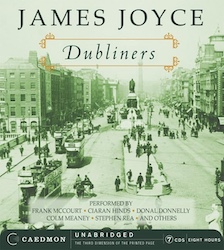
Dubliners
Read by Frank McCourt, Stephen Rea, Colm Meaney, and others.
Caedmon/Harper Collins, 2000
Cassette | CD | FLAC & MP3
Unabridged; 8 hours
Contents:
“The Sisters”—Frank McCourt
“An Encounter”—Patrick McCabe
“Araby”—Colm Meaney
“Eveline”—Dearbhla Molloy
“After the Race”—Dan O’Herlihy
“Two Gallants”—Malachy McCourt
“The Boarding House”—Donal Donnelly
“A Little Cloud”—Brendan Coyle
“Counterparts”—Jim Norton
“Clay”—Sorcha Cusack
“A Painful Case”—Ciaran Hinds
“Ivy Day in the Committee Room”—T.P. McKenna
“A Mother”—Fionnula Flanagan
“Grace”—Charles Keating
“The Dead”—Stephen Rea
Originally released in 2000 by Caedmon, this set collected a few existing recordings and added many new ones. The result is a celebration of Dubliners featuring an all-star cast of Irish actors. Unfortunately, the set never made the leap into the digital age, and is currently only available on compact disc. Of course, it might just be possible that someone has “liberated” the set and made it available as FLAC and MP3, but that could be just a rumor. Anyway, if you’re interested, meet me behind the pub…
In any event, here’s the Brazen Head’s original review, written by yours truly back in 2000:
This set is an amazing accomplishment, an audio masterpiece that does full justice to Joyce’s poignant tales of epiphany and paralysis. Not since Sir Derek Jacobi’s reading of the unabridged Iliad have I heard a better “book on tape,” and as with the Iliad, it’s refreshing to hear actual storytelling rather than dramatic monologues delivered by celebrities with little connection to the material. Most of the readers are familiar with Joyce from previous experience, and Caedmon has done a brilliant job of matching each actor to a story, resulting in fifteen readings as unique and personal as the Dubliners themselves.
Frank McCourt opens with a gruff but steady reading of “The Sisters,” his working-class demeanor an effective foil for the narrator’s repressed anger and the pathos of Father Flynn’s paralysis. This is followed by Patrick McCabe’s “An Encounter.” Possibly the most disturbing story in Dubliners, the author of the The Butcher Boy gets right to the rotting core of the tale, speaking in a measured, confessional manner, as if he were sharing a story from his own youth. The narrative develops slowly, and is suffused with a sinister tension. McCabe’s dialogue is hypnotic—his old man’s voice is layered with false sweetness, innuendo, and seedy desperation. I’ve always favored “An Encounter,” but hearing McCabe’s rendition gave me chills, and reinforced the daring nature of the story itself. The stories of the “childhood” section end with Colm Meaney’s account of “Araby,” voiced in a tone of adolescent confusion, filled with equal mixtures of naive longing and self-deprecating bitterness.
“Adolescence” is next. “Eveline” is given a close and sympathetic reading by Dearbhla Molloy, who delivers the concluding sentence with devastating finality. This sense of despair is quickly skewered by Dan O’Herlihy, whose resonant baritone imparts “After the Race” with enough false warmth and twinkling good cheer to raise Joyce’s irony to a new level. Malachy McCourt grants “Two Gallants” a similar, but less expansive style, voicing his gallants with a charmless rancor that crowns their “conquest” with a sharp halo of black humor. Donal Donnelly adds to the tales of deception with a deadpan reading of “The Boarding House,” his literal manner highlighting Joyce’s evasive prose and deftly touching its reveries with fecklessness and doubt.
The remainder of the stories fall under “adulthood/public life,” and are generally more lengthy than the previous ones. “A Little Cloud” is another highlight of the collection. Tony winner Brendan Coyle brings Little Chandler and Ignatius Gallaher to life with a magnificent ease—their conversation is charged with unspoken tensions, and the shallow worldliness he reveals in Gallaher is matched by the dull anger, fruitless dreams, and unfocused frustration he draws from his companion. A similar sensitivity to dialogue is brought to “Counterparts” by Jim Norton, who tells his story with a dynamic range of theatrical devices—his Mr. Alleyne is quite a creation, and almost makes the onerous Farrington more sympathetic. “Clay” follows, and Sorcha Cusack—daughter of Caedmon’s original Joycean reader Cyril Cusack—reads the spinster’s tale like a children’s story gone sour. Her fairy-tale cadence underscores the brittle nature of Maria’s reality, portraying an aging woman whose superficial attachments mask a tragic emptiness. Next is Ciaran Hinds and “A Painful Case.” His reading is refined, slightly detached, and perfectly timed; one senses the repressed pain behind every turn of phrase. As with many of the stories, the end is a punch in the gut.
T.P. McKenna’s “Ivy Day in the Committee Room” returns to the theatrical style that marked the stories of “adolescence.” McKenna invests his cast of characters with so much energy and personality it’s easy to forget there’s only one narrator. Despite these actorly gymnastics, McKenna never overwhelms the story, keeping track of the bitter undercurrent that surfaces in the final line of the story, delivered with a deliciously-understand sarcasm. “A Mother” is envenomed by a similar sarcasm, flowing just beneath the surface of Fionnula Flanagan’s gossipy mien of mock-propriety. The penultimate story, “Grace,” is read by Charles Keating, who allows cynicism to mellow into affectionate parody. Despite the pompous and ill-starred ways of Kernan and his ilk, Keating grants them the closest thing to genuine “grace” in the collection.
The final story is, of course, “The Dead,” and is read by Stephen Rea. An actor who radiates a kind of thought-tormented complexity, it’s difficult to imagine a better voice for Gabriel Conroy, from his melancholy aloofness to his anxious self-doubt, from the genuine affection he feels for his companions to his conflicting desire to be elsewhere. Rea skillfully avoids pomposity and self-pity, touching Gabriel’s less charitable thoughts with enough self-awareness and wistful longing to maintain our sympathies. This sensitivity extends to the entire cast—the holiday party feels instantly recognizable, a loving gathering of family and friends not without its rough edges and hurtful insinuations. The famous closing scene comes off beautifully. Shorn of their accumulated literary weight by Rea’s wonderful simplicity, the final lines feel like they’re being discovered for the first time.
The collection closes with a reading of the credits, a jarring reminder that one has not, in fact, been transported to another time and place. It’s a rare performance that has this effect, and there’s no better recommendation.
Dubliners
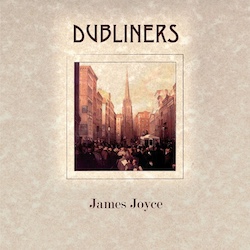
Dubliners
Read by Ralph Cosham
InAudio, 2000
Also available as: CD-MP3
Unabridged; 6 hours, 7 minutes
InAudio is a company that provides royalty-free music for film and YouTube, along with audiobooks of works in the public domain. This collection is read by the Shakespearean actor Ralph Cosham (1936-2014), born in Britain but raised in the United States. He touches the stories with a light—but inconsistent—Irish accent. There’s nothing wrong with Cosham’s reading, but with so many better alternatives, it’s hard to recommend it above the pack.
Dubliners
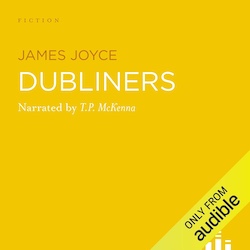
Dubliners
Read by T.P. McKenna
CSA Telltapes, 2003
Also available as: CD
Unabridged; 7 hours, 25 minutes
The Irish actor Thomas Patrick McKenna (1929-2011) had a long career on the stage and screen. Known for his rich, lustrous voice, McKenna was often selected to narrate features on the BBC. His Joycean pedigree is unimpeachable: McKenna starred as Robert Hand in Harold Pinter’s production of Exiles, as Buck Mulligan in Joseph Strick’s film of Ulysses (1967) and then as Simon Dedalus in Strick’s A Portrait of the Artist as a Young Man (1977). He also narrated the RTÉ Joyce documentary, Is There One Who Understands Me. His reading of Dubliners is excellent, each character brought life in exquisite detail. Recommended.
Dubliners
Dubliners
Read by Daniel Adam Day
Marcello Bettoni, 2008
Unabridged; 7 hours, 5 minutes
An American actor and musician, Daniel Adam Day has dozens of audiobooks to his credit. Unfortunately, there’s not much to recommend this version of Dubliners—even if you accept Day’s unapologetically American accent, there’s a sing-song quality to his reading that flattens the narrative and invites boredom. There’s also the questionable cover… Is that Eveline in the upper left? Does Marcello Bettoni know these stories are set in Edwardian Dublin? It’s safe to skip this one. [As of June 2024, this recording seems to have been pulled from the market?]
Dubliners
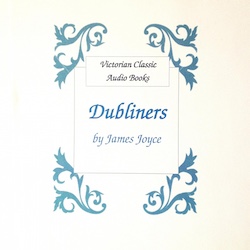
Dubliners
Read by Tadgh Hynes
Victorian Classics, 2013
Unabridged; 6 hours, 36 minutes
Tadgh Hynes is an Irish narrator who specializes in Victorian fiction. His reading of Dubliners is one of my favorite single-narrator versions. Hynes has a wonderful Dublin accent, and he brings out all the nuances in Joyce’s text—the humor and warmth, confusion and doubt, wonder and irony, aloofness and pretension. While Hynes takes the readings at a somewhat faster pace than most—his Dubliners is an hour shorter than average—there’s an authentic, conversational tone to the reading that gives them a rare immediacy. (It’s a shame about the DIY-cover!) Highly recommended.
Dubliners
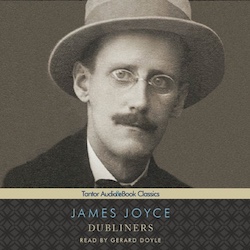
Dubliners
Read by Gerard Doyle
Tantor, 2011
Also available as: CD
Unabridged; 7 hours, 14 minutes
Founded in 2000, Tantor was a California audiobook company acquired by Recorded Books in 2015. Named an AudioFile “Golden Voice” for his many audiobook narrations, Gerard Doyle reads Dubliners in a rich, Irish accent. Doyle has the mannerisms of a storyteller, with fine dramatic timing that holds the reader’s attention. Recommended.
Dubliners
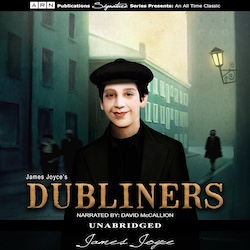
Dubliners
Read by David McCallion
A.R.N., 2016
Unabridged; 6 hours, 29 minutes
David McCallion is a Scottish voiceover artist and audiobook narrator. While his accent is fairly mild, it’s a bit disorienting to hear Dubliners read with a Scottish accent, and there’s nothing particularly compelling about his reading to recommend it above better offerings. Also, Jesus wept, that cover!
Dubliners
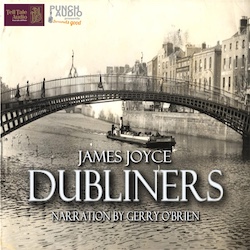
Dubliners
Read by Gerry O’Brien
Punch Audio, 2016
Unabridged; 6 hours, 30 minutes
Gerry O’Brien is an Irish actor with experience on stage and screen, and has a thriving career as a voiceover artist. His reading of Dubliners has a certain urgency and actorly panache, but lacks musicality and nuance.
Dubliners
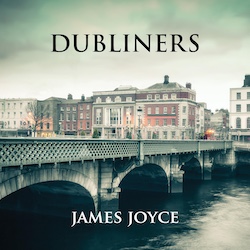
Dubliners
Read by Connor Sheridan
Dreamscape Media, 2017
Unabridged; 6 hours, 46 minutes
Although he’s an American, Connor Sheridan affects a convincing Irish accent for Dubliners, and reads the stories with sensitivity and emotional depth. His “boys” sound young and breathless, while his “adults” come across as weary and jaded. He may not be the most authentic reader, but his actorly approach makes the Dreamscape Dubliners a solid choice.
Dubliners
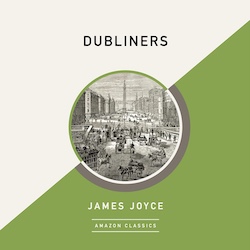
Dubliners
Read by Alan Smyth & Alana Kerr Collins
Brilliance Audio, 2018
Unabridged; 8 hours, 14 minutes
Founded in Michigan in 1984, Brilliance Audio was acquired by Amazon in 2007. Their recording of Dubliners is distinguished for having two narrators—the Irish actor Alan Smyth, and the Belfast-born actress Alana Kerr Collins. Smyth lays on the drama pretty thick, affecting an array of voices for the characters and speaking the narration with a curious intensity. Sometimes it works, and sometimes it doesn’t—for instance, the sample of him reading from “The Sisters” seems to miss the point of the story. Collins is less dramatic—more a “reader” than an “actor”—but her voice has a satisfying precision, and it’s always welcome to hear a woman reading stories like “Eveline” and “Clay.”
Dubliners
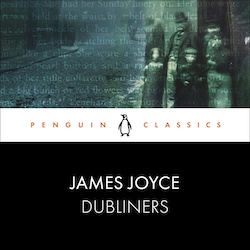
Dubliners
Read by Andrew Scott
Penguin, 2019
Unabridged; 8 hours, 34 minutes
In 2019 Penguin replaced their previous Dubliners audiobook, narrated by Gerard McSorley, with a new version read by Dublin actor Andrew Scott. Famous for playing Moriarty in Sherlock and “The Priest” in Fleabag, Scott also has Joycean credentials: in the 2000 film Nora, he played Michael Bodkin, Nora Barnacle’s first love and the inspiration for Michael Furey in “The Dead.” Scott gives his full attention to the stories, investing them with nuance and revealing their emotional depth—the man is a master of the dramatic pause! The last few sentence of “The Dead” are pure poetry, almost whispered from a melancholy reverie—you can feel the cold glass of the windowpane. A masterful reading, and highly recommended.
Dubliners
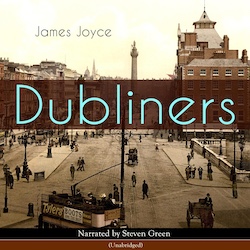
Dubliners
Read by Steven Green
Audioliterature, 2019
Unabridged; 7 hours, 27 minutes
This collection is read by American actor Steven Green, who affects an idiosyncratic—and uneven—Irish accent throughout. Not recommended.
Dubliners
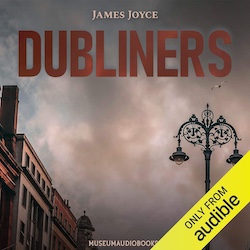
Dubliners
Read by Stewart Crank
Museum Audio Books, 2020
Also available as a bundle: The Ultimate James Joyce Collection
Unabridged; 7 hours, 25 minutes
This Audible-only version is read by British voice actor Stewart Crank. He has a pleasant English accent and the flair of a storyteller—nothing is overdone, and everything feels lucid and distinct, with just the right amount of “acting.” Visitors interested in Crank’s Dubliners are recommended to purchase The Ultimate James Joyce Collection, which includes Crank’s Dubliners, Portrait, and Ulysses bundled together for 1 Audible credit.
Dubliners
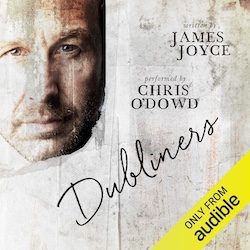
Dubliners
Read by Chris O’Dowd
Audible Studios, 2021
Unabridged; 7 hours, 22 minutes
Irish comedian and actor Chris O’Dowd is best known for his role of Roy Trenneman in The IT Crowd. While a young comedian may be a surprising choice to read Dubliners, O’Dowd does an excellent job, bringing an actor’s instincts to the text and revealing its full spectrum of emotional complexities. Of all the versions of Dubliners profiled on this page, O’Dowd’s reading most resembles Alan Smyth’s—a “young man’s Dubliners,” so to speak—but O’Dowd is more successful. His voice contains a scorn and self-loathing which bring a welcome acidity to these “tales of scrupulous meanness.” Recommended despite the terrible cover!
Dubliners
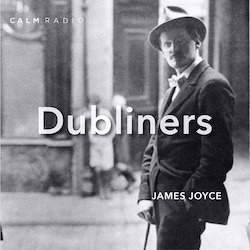
Dubliners
Read by Mary Jane Wells
Author’s Republic, 2021
Unabridged; 7 hours, 29 minutes
Author’s Republic is an independent audiobook distributor established in 2011. This is the only Dubliners audiobook read entirely by a woman, the Scottish actress Mary Janes Wells. She does a wonderful job, clearly having fun with the speaking parts but never losing track of Joyce’s narrative subtleties. Her Irish accents are far from consistent, but she’s such a good storyteller it becomes part of the charm. Recommended. (Though to continue my griping about these lousy covers, could someone not have photoshopped Sylvia Beach’s coat from the lower left of the photo?)
James Joyce Collection: Ulysses, Dubliners, and A Portrait of the Artist as a Young Man
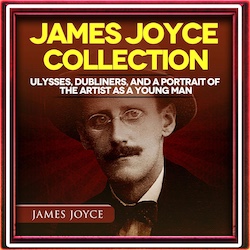
James Joyce Collection
Read by Rory Young
Montgomery Providence Publishing, 2021
Unabridged; 43 hours, 2 minutes
This collection is read by Canadian voice actor Rory Young, and is listed here because Young’s reading of Dubliners is not available as a separate edition. His narration is pleasant enough, but his neutral, North American accent and lackluster delivery are more suited to a corporate video than Joyce’s multivalent prose. If you’re in the mood for a Joyce bundle, Stewart Crank set is a better option.
Selected Stories
Dubliners: A Selection of Short Stories
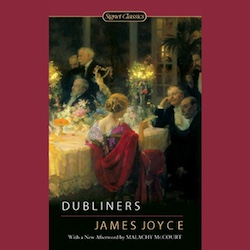
Dubliners: A Selection of Short Stories
Read by Gerard McSorley
Penguin HighBridge Audio, 1993
Also available as: Cassette
Abridged; 2 hours, 32 minutes
Penguin’s first edition of Dubliners offers several unabridged stories, including “The Sisters,” “Araby,” “Eveline,” “The Boarding House,”“Grace,” and the “The Dead.” They’re read in a soft, melodious voice by Gerard McSorley, the Irish actor who played Michael Evans in the première of Dancing at Lughnasa. (He was also a student of Seamus Heaney!)
Dubliners: “Araby,” “Eveline,” and “Counterparts”
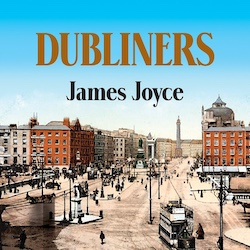
Dubliners: “Araby,” “Eveline,” and “Counterparts”
Read by Charles Keating
Dover, 1996
Abridged; 54 minutes
A selection of three stories read by British actor Charles Keating (1941-2014). Keating possesses a rich, plummy voice, but his style seems more appropriate to Dickens or Austen than Joyce’s Dubliners—or at least the youthful tales of “Araby” and “Eveline,” which come across as reminisces from a much older narrator. One wonders if a different selection of stories may have better suited his voice; perhaps “Ivy Day” and “A Painful Case”?
James Joyce’s “The Dead” and Other Stories from Dubliners
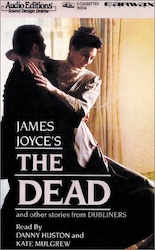
James Joyce’s “The Dead” and Other Stories from Dubliners
Read by Danny Huston & Kate Mulgrew
Audio Partners, 1998
Abridged Cassettes
This 2-cassette set made quite an impression when it was released in 1998 as a loose tie-in to John Huston’s final film, The Dead. It was also the first Joycean audiobook to feature “celebrity” talent, as opposed to Shakespearian actors and “book-on-tape” readers. Unfortunately, like the Caedmon Dubliners, it failed to make the transition to the digital era. If anyone has an MP3 version of this set, please contact the Brazen Head! Anyway, here’s an updated version of the original review:
This set contains an unabridged version of “The Dead” and three other Dubliners stories: “The Sisters,” “Eveline,” and “The Boarding House.” The readers are Kate Mulgrew, a Hedda Gabler veteran best known as Voyager’s Captain Janeway and “Red” Reznikov from Orange Is the New Black; and Yellowstone’s Danny Huston, the son of John Huston and half-brother of Angelica Huston, who played Gretta Conroy in their father’s film of The Dead.
“The Dead” is set up as “recreation” of the story, including sound effects, music, and dramatic dialogue. The narrative parts are split evenly by Mulgrew and Huston, who are also called upon to bring each of the characters to life. While this is a worthwhile idea, the recording falls short of seeing it through effectively. In order to differentiate between narration and dialogue, the producers placed a slight echo effect on all the dialogue—an unfortunate practice common to certain “radio plays.” While this certainly differentiates the two, the characters sound like they’re speaking from a distance or from within a deep, Beckettian cistern. To make matters worse, the producers lacked the chutzpah to edit the “dialogue tags” from the text. While this is a common problem with audiobooks—does one remain faithful to the text and create a maze of unnecessary “saids,” or does one casually drop them and let the voices speak for themselves?—here it feels like doubling-down on awkwardness, as markers such as “Gabriel said” are followed by hollow, electronically-distorted lines of dialogue that only increase the level of artifice.
Of the two readers—both Americans who adopt Irish accents—Kate Mulgrew is much more successful. Her Greta is charming but strong-willed, and she brings just enough individuality to her other female characters to make them stand apart. While her husky voice and brisk pace take getting used to, her reading contains a gentle humor and a careful attention to shading and nuance. Danny Huston also invests his “secondary” characters with unique personalities, but his Gabriel Conroy is lamentably flat. His narrative passages are no better, a prosaic reading which fails to exploit Joyce’s many subtleties and ironies.
The sound effects are used sparingly; touches of background color and occasional music. The latter is particularly welcome, such as the runs and flourishes of Mary Jane’s recital, which makes Gabriel’s wry description all the more amusing. Unfortunately, the songs are not actually sung. Perhaps this was too much to expect, but who wouldn’t like to hear “The Lass of Aughrim?”
The accompanying stories are read in a conventional manner; “The Sisters” by Huston, “Eveline” and “The Boarding House” by Mulgrew, who does a fine job. A short “Afterword” by Stanford professor William M. Chase may be of interest to students or first-time readers.
Dubliners (7 Stories)
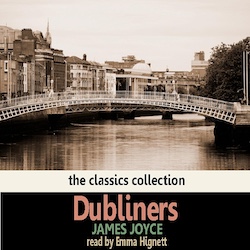
Dubliners (7 Stories)
Read by Emma Hignett
Saland Publishing, 2011
Abridged; 1 hours, 59 minutes
This abridged collection was released by Saland Publishing, a somewhat mysterious entity with little online presence. Emma Hignett is a British voice actor who works from a private studio in Teesdale. Here she reads seven stories from Dubliners, including “The Sisters,” “Araby,” “Eveline,” “An Encounter,” “After the Race,” “Two Gallants” and “A Little Cloud.” She has a pleasant voice with a crisp British accent, but her readings are fairly straight-forward, and lack the actorly style that enlivens many other sets.
The James Joyce BBC Radio Drama Collection
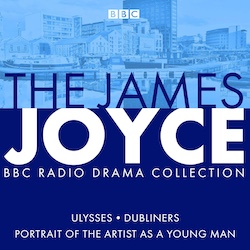
The James Joyce BBC Radio Drama Collection
Read by Andrew Scott, Frances Barber, Henry Goodman, Jim Norton, Niamh Cusack, Stephen Rea
BBC Digital Audio, 2019
Also available as: CD
Abridged; 13 hours, 12 minutes
This collection contains abridged versions of previously-released BBC radio dramas. The following description is from the publisher:
Ulysses
In this full-cast dramatisation of Joyce’s epic modernist novel, the stories of Stephen Dedalus and Leopold Bloom combine as they meander through Dublin in the course of one day, 16 June 1904. Andrew Scott stars as Stephen, with Henry Goodman as Bloom, Niamh Cusack as Molly Bloom and Stephen Rea as the Narrator.
A Portrait of the Artist as a Young Man
An abridged reading of James Joyce’s autobiographical masterpiece portraying the adolescence of Stephen Dedalus, who must question the culture and religion of his native land before he can break free to become an artist. Read by Andrew Scott.
Dubliners
This abridged collection of 15 naturalistic tales depicts an array of characters from childhood through adolescence to maturity. Stories of love, loss, friendship, marriage, politics and family combine to create a unified world and a celebration of a city. Read by Stephen Rea.
James Joyce—A Biography
Gordon Bowker’s comprehensive study explores Joyce’s years spent in exile in Europe and examines how his life shaped his genius. Read by Jim Norton, with Andrew Scott as the voice of Joyce.
Joyce Audio
[Main Page | His Own Voice | Collections | Dubliners | Portrait | Ulysses | Finnegans Wake | Drama & Poetry | Biography & Criticism | Miscellany]
Author: Allen B. Ruch
Last Modified: 14 June 2024
Main Joyce Page: The Brazen Head
Contact: quail(at)shipwrecklibrary(dot)com


